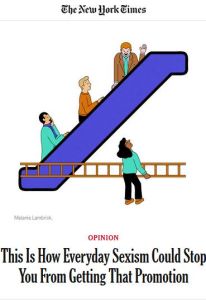加入 getAbstract 阅读摘要

加入 getAbstract 阅读摘要
Jessica Nordell
This Is How Everyday Sexism Could Stop You from Getting That Promotion
The New York Times, 2021
看看什么内容?
Learn the devastating impact of everyday gender bias in the workplace.
Recommendation
Egregious violations of gender equity in the workplace garner headlines and lawsuits, but subtle, routine gender bias can be just as devastating to women’s careers. In an opinion piece for The New York Times, journalist Jessica Nordell discusses the startling findings from a University of Buffalo study of everyday gender bias in the workplace. The data, illustrated by Yaryna Serkez, corroborate all the women who’ve felt they had to work twice as hard as men to advance in their careers. Nordell reveals research-based interventions to help leaders and managers create a fairer workplace.
Summary
About the Author
Jessica Nordell is a science and culture journalist and the author of The End of Bias: A Beginning.



















Comment on this summary